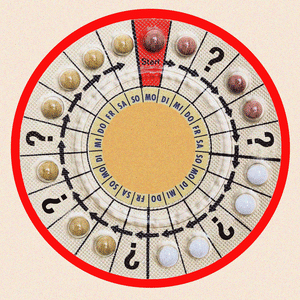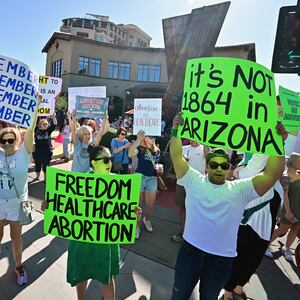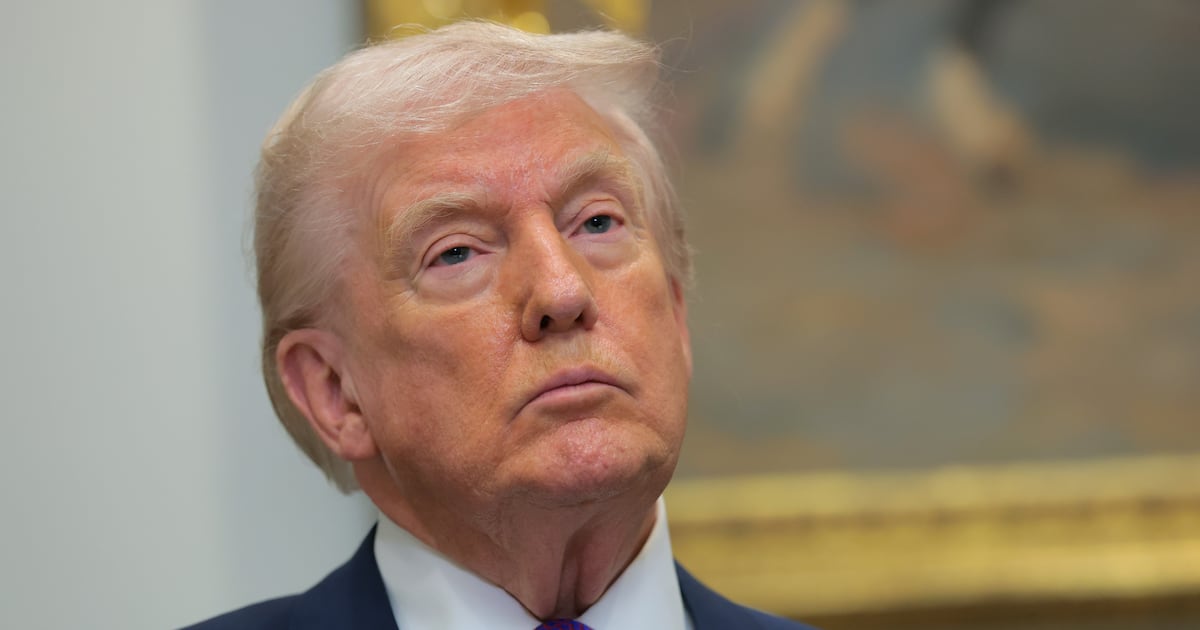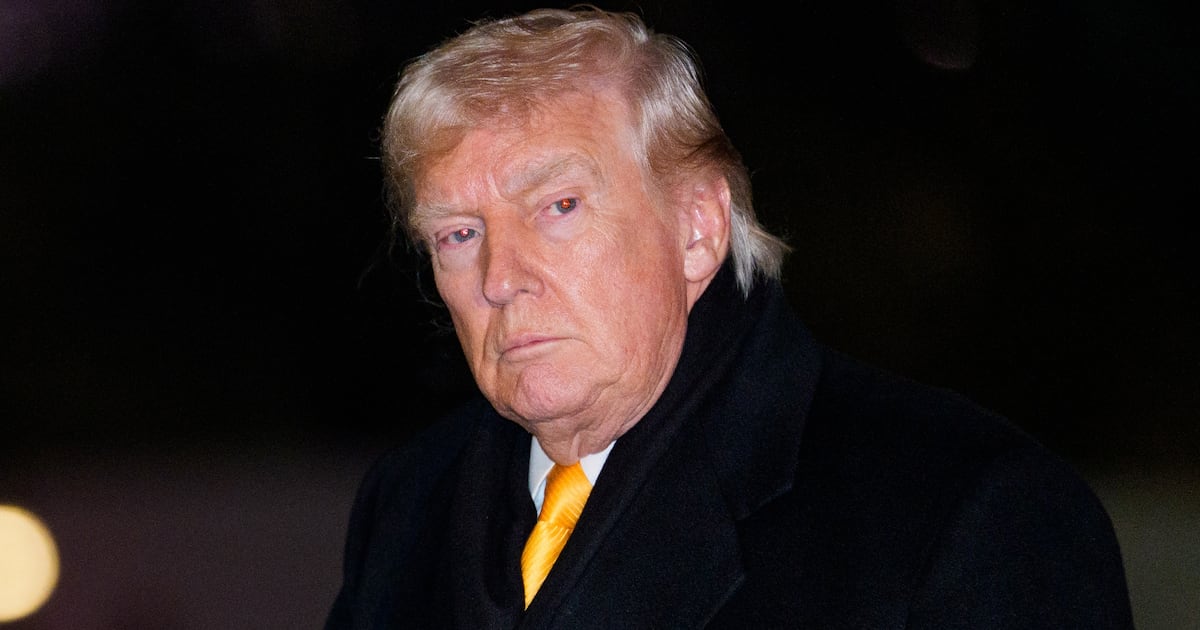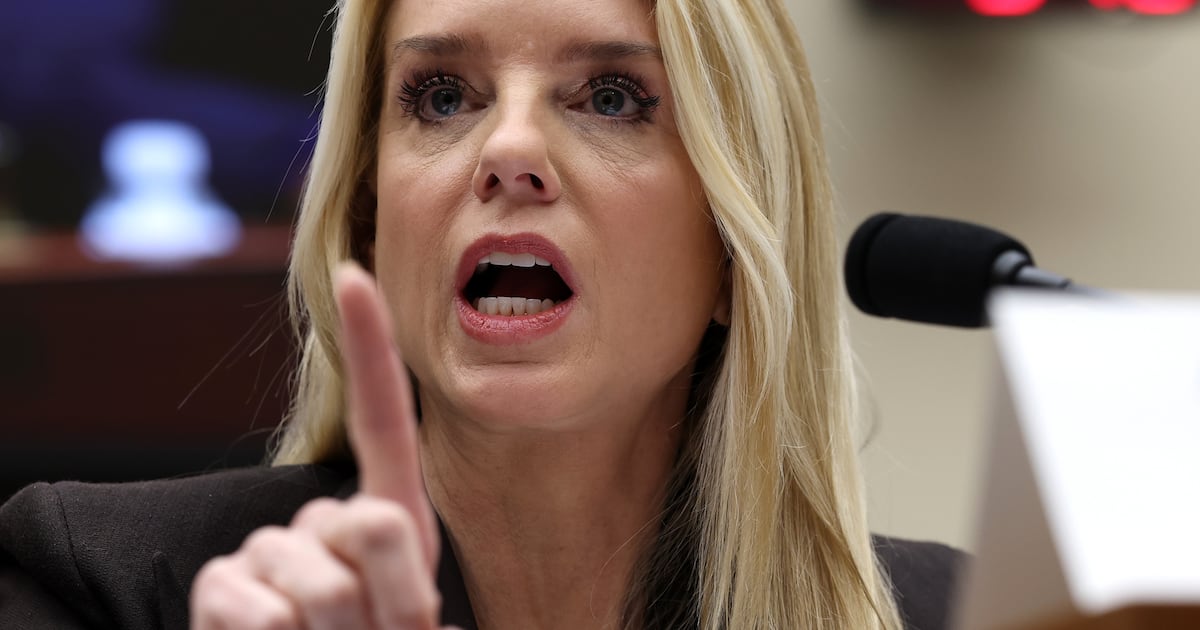Before the Arizona Supreme Court ruled last week to let the state’s Civil War-era abortion ban stand, the campaign to put abortion rights directly on the state’s ballot this November was coasting along.
But with a stroke of a pen, the court enacted what could be the harshest abortion ban in the country—and also unleashed a tsunami of energy behind a ballot initiative that could reverse that ban by allowing Arizonans to vote to secure the right to abortion in the state constitution.
It also could sway a Senate election and be decisive in the presidential contest.
Dawn Penich, spokesperson for Arizonans For Abortion Access—the group that proposed the voter initiative and led the campaign to gather signatures required to qualify for the ballot since last year—told The Daily Beast that, since the ruling, there’s been “a tremendous surge of support and interest, both in people signing the petition, as well as wanting to become volunteers who circulate the petition.”
Penich added that the signatures “are coming in so quickly, and in such high numbers all over the state, I don’t even have my own internal number for today.”
Rep. Ruben Gallego (D-AZ), the Democratic candidate for Arizona’s contested U.S. Senate seat, has instructed his volunteers to also carry petitions and literature for the abortion ballot initiative. After the court’s decision, “people are literally breaking down the door trying to get in there to sign the abortion initiative,” Gallego told The Daily Beast.
In Arizona, one of the nation’s top 2024 battlegrounds, the broader implications of the push are enormous. Democrats and organizers believe the ballot initiative could drive historic voter turnout, simultaneously lifting up President Joe Biden, Gallego, and other Democrats running in the state’s key congressional and state legislative races.
“Women are scared. Of course they’re going to turn out. There’s zero doubt in my mind,” Gallego told The Daily Beast.
Voters, he predicted, are going to look at the politicians who said the 1864 ban was a great law, like his opponent Kari Lake, and “they’re going to punish them.”
Close observers in Arizona also feel a sea change coming. “As it looks today, I can’t imagine a better environment for the Democrats,” said Chuck Coughlin, a longtime Arizona GOP pollster and strategist.
But this dynamic isn’t unique to Arizona. Similar abortion ballot initiatives are reshaping the political landscape in a number of states that could decide control of the White House and Congress.
Democrats believe Republican candidates in these states will face stiff headwinds if they’re on the ballot next to a proposed amendment to codify abortion rights at the highest levels.
“The choice and the contrast is very clear,” said Sen. Tina Smith (D-MN), a former Planned Parenthood executive and a vice chair of the campaign arm for Senate Democrats. “The fact that you have these initiatives on the ballot makes this issue even more salient to voters who are going to be turning out to vote.”
In three states—Florida, Maryland, and New York—voters are guaranteed to see initiatives that would codify abortion rights. And in six others, campaigns are underway to gather the requisite number of signatures to get on the ballot: Nevada, Montana, Nebraska, Colorado, Arizona, and Missouri. (In two, South Dakota and Arkansas, ballot initiatives to secure some abortion access are proceeding, but they contain proposed limits that have alienated some activists.)
With a combined 17 electoral votes, Arizona and Nevada could be decisive in another tight Trump-Biden rematch. Those states, plus Montana, Maryland, and Florida, will host some of the most competitive Senate races of the year, and Democrats are already hammering GOP candidates in these states about their abortion records. Among the states that could see abortion ballot initiatives, Democrats have identified 18 competitive U.S. House races—several times the number needed to flip the chamber. The official campaign arm for House Democrats is tracking the push closely.
“When people head to the voting booth in November to defend their reproductive rights, these Republicans will be on the same ballot, and their unpopular anti-freedom records will cost them the election,” said DCCC spokesman Viet Shelton.
The presence of those ballot questions will at least make it harder for Republicans to skirt questions about where they stand on abortion access.
When asked about his stance on the possible Nebraska initiative, swing district Rep. Don Bacon (R-NE) didn’t commit to a position. “I just go with the voters, if that’s where the voters are at,” said Bacon, who expressed the sentiment multiple times when pressed.
Bacon told The Daily Beast he was an “advocate for life”—his record is strongly approved by anti-abortion groups—and argued most Nebraskans support abortion up until three months of pregnancy.
The potentially seismic impact of these ballot initiatives on the 2024 election was only made possible by the initial shock of the Supreme Court’s Dobbs ruling in 2022 that overturned the national right to abortion.
The decision instantly turned every state into a battleground for abortion rights, with legislators imposing new restrictions or protections depending on the state. But abortion rights advocates have identified ballot initiatives as the most direct and effective way to give voters the ultimate say.
When voters get that chance, they almost always vote to uphold abortion rights in large numbers—even in red states like Ohio and Kansas.
In 2024, the clearest impact of the ballot initiatives could be that it generates serious voter enthusiasm to head to the polls, addressing what has been the most persistent problem for Democrats with an unpopular Biden leading the ticket, said Coughlin.
“What you can say about this unequivocally is that it helps to resolve the enthusiasm problem on the Democratic side of the ticket,” he said, adding that Arizona’s initiative could make it much harder for the state’s two swing-district Republicans, Reps. David Schweikert and Juan Ciscomani, to retain their seats.
The breadth of states where ballot initiative pushes are underway speaks to that groundswell of voter enthusiasm, say close observers.
“If you had talked to me a year ago, I would have been very surprised there were 11 measures moving at this juncture,” said Sarah Standiford, the national campaigns director for ballot measures at Planned Parenthood Action Fund.
It’s not guaranteed that all measures, or even most of them, will get enough signatures to successfully make the ballot. But Standiford expressed confidence in where many state efforts sit currently.
“I’m not going to make bets, but I do think we've done everything, they've done everything they can, collectively, to overcome the first set of obstacles,” she said.
There’s high enthusiasm for ballot initiatives even in states without as harsh of a ban as Arizona—or any ban at all.
In Nevada, for instance, abortion is legal up until 24 weeks of pregnancy under state law, which was codified in a 1990 referendum vote.
“People are coming up to our petition circulators—when they learn this initiative is about protecting abortion access, they want to sign it right away,” said Tova Yampolsky, spokesperson for Nevadans For Reproductive Freedom, the group working to put an initiative before voters to make abortion a fundamental right under the state constitution.
From the state-level branches of the Biden campaign to local campaigns, operatives are closely tracking these pushes and the impact they could have on their own races. In some states, Democratic campaigns cannot specifically communicate or coordinate with outside groups that are organizing the ballot initiatives, but the natural overlap between their constituencies means that
When Vice President Kamala Harris visited Nevada last week for a campaign event focused on protecting abortion rights, for instance, canvassers for Nevadans For Reproductive Freedom were on site collecting signatures.
What organizers stress, however, is a unique dynamic that shows the political power of abortion access. Many supporters of these ballot initiatives are not Democrats. When Ohio’s Issue One abortion constitutional amendment was approved last year, the measure won majorities of voters in several counties Trump carried in 2020.
When Nevada’s campaign talks to voters about the issue, Yampolsky said, it’s a different kind of political discussion. “It’s not a conversation about partisanship in any way,” she said. “It’s about protecting our fundamental rights.”
Of course, there will be plenty of pushback to these initiatives from staunch conservatives, fueled by the well-organized and committed anti-abortion movement that has existed for decades.
Asked to comment on the abortion ballot initiatives, a spokesperson for Susan B. Anthony Pro-Life America, one of the leading national anti-abortion groups, referred The Daily Beast to their statement on the developments in Florida and Arizona.
Marjorie Dannenfelser, the group’s president, alleged the initiatives were “written by the far Left” and are fueled by “hundreds of millions of dollars of left-wing money designed to deceive voters about their true intent.”
“Pro-life candidates and officials must oppose them,” said Dannenfelser, a highly influential figure in GOP politics.
In reality, a split will likely emerge among Republicans—those who try to avoid the ballot initiatives, and those who oppose them outright in order to keep their conservative base on board.
As Bacon’s answer demonstrated, keeping a noncommittal distance is awkward. But the alternative might be even more awkward, as Kari Lake has shown in recent weeks.
When Arizona’s Supreme Court ruling came down, Lake joined other Arizona Republicans in condemning the return to a centuries-old law that predated the state joining the Union and calling on the legislature to find a solution. The legislature almost certainly won’t. The ballot initiative is the clearest path to overturning Arizona’s harsh ban, and Lake predicted that voters would. But at an event last week, she claimed the proposal, which would allow abortion up to 24 weeks of pregnancy, “will eventually lead to abortion up to nine months.”
Smith, the Minnesota Democrat, told The Daily Beast that if ballot initiatives proceed in other states—like Montana, where Republican Tim Sheehy is trying to unseat Democratic Sen. Jon Tester—“it will make it extremely difficult for him to fuzz up his position.”
“He has to state clearly where he stands,” Smith said of Sheehy.
Coughlin, the GOP strategist and pollster in Arizona, said Republican candidates won’t be able to have it both ways on the issue. “Our consistent advice to all candidates is, do what you believe, do not get stuck in the middle of the road—and if you do, you’re going to get hit by traffic in both directions.”
Organizers of the ballot initiative pushes, while nonpartisan, appreciate how their efforts may not only secure abortion rights but have a clarifying effect on the entire political environment around the issue.
“In a post-Dobbs world, we also expect that every elected official will be making clear where they stand on our initiative,” said Yampolsky, the Nevada organizer. “We are expecting everyone running for office this year to be talking about this, whether they want to be or not.”


